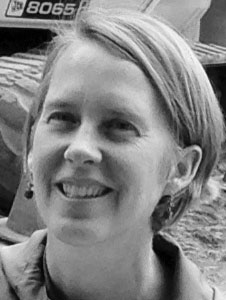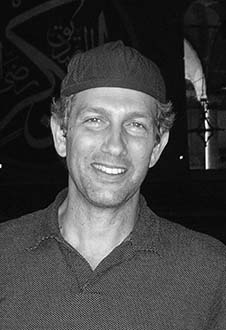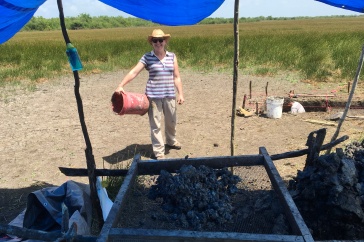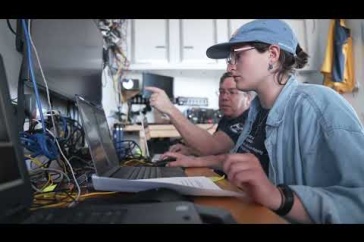The Perennial Chance to Get It Right
By Phyllis Wentworth '02G

Shuffling the roster and mentally rehearsing my opening lines, I notice that the glass apple on my bookshelf is catching the morning light. The apple was an end-of-semester gift. So were the hand-thrown ceramic mug and the purple earrings, flat enough to fit into a thank-you card. All these things I’ve more prominently arranged around me, or worn recently, as reminders that I know what I’m doing. As a child, our son loved to rearrange his room. We grew used to the sound of furniture being dragged about overhead, and to the frequently redesigned walls that highlighted new interests and downplayed old ones. Now, during his first few weeks of college, I wonder how many times he’s already reorganized his small space—seeking just the right places for his own reminders of home, independence and past successes.
In my 12th year as a college professor, the anticipation of starting a new academic year has not grown old. Previewing new readings and videos, writing the syllabus, organizing my folders—it’s all still rejuvenating to me. There’s something so hopeful about the semester cycle of beginnings and endings—the perennial chance to get it right, to try again.
This year the fresh start is even more pronounced: In the spring I left a large comprehensive community college for a private four-year technological institute. At my last school, the thrill of each new academic year struck a balance—enough mystery to make it exciting (what will the dynamic of this particular group be?), but enough familiarity to let me stand in front of the room and use my relatively soft voice to assuredly lead the way.
Now, much as my oldest child is bound to forget the right book, lose his shirts in the laundry or lock himself out of his dorm room, I continue to get lost on campus, hesitate to speak in meetings and question whether my attendance policy fits in. I switched jobs in academia once before, but I’d conveniently forgotten about the temporary loss of professional confidence.
At first, things went smoothly enough to lull me into thinking I’d made a painless transition. Then, this summer, I got my comeuppance. I’d been accustomed to teaching groups composed mostly of women who didn’t know one another before they landed together in my psychology class, which most were taking purely out of interest. Now suddenly I was teaching two sections of industrial and organizational psychology to groups of students, 90 percent of them men, who were required to be there and had been taking courses together for three years.
When I tried my previously foolproof set of discussion questions, they fizzled and died like malfunctioning sparklers. When I wanted to hear more about the thoughtful points the students had submitted in writing, most became engrossed in the tops of their desks—with the exception of a few apologetic faces that signaled, “We don’t talk about that stuff in front of each other.” And when I asked for volunteers to participate in demonstrations, for the first time in my teaching career, few hands went up.
I consider it my job to establish a trusting classroom climate where open discussion of different points of view flows freely. But these students already had their own well-established culture, including a set of classroom rules that I clearly was breaking.
I had not felt that vulnerable in the classroom for years. It took me back to my days as a grad student at UNH, where I had a kind and able teaching mentor in professor Ken Fuld. When I described to him how distracted I felt by a group of students (sorority sisters, they'd told me) whose whispers and body language seemed to poke fun at my new-teacher mannerisms, he coached me patiently. No matter how things look from where we stand, he said, most student behavior has nothing at all to do with the teacher. There is so much more going on than what we may be aware of in any moment.
It took a few years for that lesson to sink in, but it eventually did, along with the realization that as hard as I strived to be the best professor I could be, I would never be the best match for every student in every class—an insight that is much easier said, or written, than lived.
Yet those lessons seemed out of reach this summer as I wondered how I could have lost my touch. Opening up to a couple of my warm and welcoming colleagues, I heard echoes of Ken Fuld’s observations. As they talked about their experiences teaching at a technical institute where many students follow a prescribed set of courses from start to finish, all together, it dawned on me that there was indeed “so much more going on” than I’d been aware of. Sure, my cluelessness was a contributing factor —but only one.
Sometime after I figured this out and began yearning for the chance to try again, from the top, I showed my students Steve Jobs’ 2005 commencement speech at Stanford. I was more moved by it than they appeared to be—especially the conclusion, when he talked about the importance of staying “hungry and foolish.” Leaving the known for the unknown is always a leap of faith. I am glad I made this one. It has been humbling and uncomfortable, and at times a bit too much like facing those sorority sisters all over again.
As much as I look forward to regaining my hard-won teaching balance, I will try to keep fresh the emotional memory of what it’s like to be new, somewhat unmoored and in need of perspective. Feeling a little hungry and foolish might keep me in touch with what first-year students, including my son, are experiencing this fall.
After 10 years at two community colleges in Massachusetts, Phyllis Wentworth became an associate professor of humanities and social sciences this year at Wentworth Institute of Technology in Boston.
Her name and the school’s are entirely unrelated. A shorter version of this piece was previously posted to the Academe blog.
America, the Mythical
By Louis Mazzari '04G

One student’s note went right to the point: “I am taking this course because I am an enemy of the United States.”
A second was effusive: “Growing up in Bulgaria, what sent my parents out into the streets in protest against the Communist government, what made our struggles worthwhile, was the dream that if we struggled hard enough, some day we could become like America.”
“I want to take this course,” explained a third, a young Turkish man on the first day of American history last year, “because I’m a fan of Tupak Shakur, and I play for the Sultans” American-football team. His views on U.S. foreign and economic policy counted less than his feel for the crunch of a downfield tackle and a heavy bass line.
In Istanbul, you hear the word “Amerika” in shops and cafes, on buses and on television; it’s a mythological presence. In classrooms you see why. America is a Rorschach test for Turkish students and other citizens interested in everything from gender relations to international diplomacy. It’s a measuring stick, a cudgel and an excuse. It’s a nest of conspiracies. It’s a reward for diligence. For the last decade I’ve taught at two very different universities in Istanbul. Both have reminded me every day to forego any assumptions I’d have at home about how a class will run. The U.S. engages students’ imaginations, admiration or ire, producing digressions that make my work interesting.
An hour on the settlement of colonial America may turn into a primer on the Protestant Reformation and the metaphysics of Catholicism. Do all Christians obey the Pope? students will ask. Are there cultural differences between Catholics and Protestants? In another class, no one may have heard of Thomas Jefferson, but many have read John Locke. What’s the connection between the European Enlightenment they have studied and the American system of government they haven’t?
I first landed in Istanbul to teach American history at an Islamist university, where I found perspectives that surprised me. In a crowded hallway after class one day, a quiet young woman wearing an Islamic headscarf turned to me and said, “I love the United States because you can burn your flag.”
To this thoughtful Muslim, the freedom to burn the flag meant not only unfettered expression, but the immense security of the rule of law. I’d never thought about it that way. She was speaking up for free speech in a place where Nobel Prize winner Orhan Pamuk had recently been convicted by a high court of “insulting Turkishness”—because he’d told a foreign reporter that, in his country, Kurds and Armenians had been killed.
For the last seven years I have taught at the staunchly secular Bogazici University, built high on a bluff overlooking the Bosporus Strait north of the old city. (Bogazici is the Turkish version of Bosporus.) The strait is the 20-mile-long waterway that runs from the Black Sea and Russia south toward the Aegean and Mediterranean. It’s the route of an unceasing parade of tankers, freighters and cargo ships from China, Canada, Russia, Argentina and New Zealand.
Istanbul spans the Bosporus, which, everyone in the city will tell you, is where Europe and Asia join and collide. The eastern bank is where Asia begins. Cross a bridge westward, and a sign says, “Welcome to Europe.” The twain is met hundreds of times a day by a multitude of ferries and water taxis, by bridges and tunnels.
The first American overseas university, Bogazici was established as Roberts College by New England missionaries in the 1860s. During the late 19th century, it so well accomplished its mission of providing education in science and technology—rather than religious instruction—that it drew students from around the Ottoman Empire and educated several Balkan heads of state. The national government has run the university since the 1970s. Admission is highly competitive; people call Bogazici the Harvard of Turkey.
Having been high achievers all their young lives, these students are interested in the concept of success. So, in my courses, they want to know why America has been so clearly marked by success. For some, the reasons appear to be the result of great natural resources, an influx of talented immigrants and participatory democracy. For others, America’s success traces to imperialism, its nuclear arsenal, the CIA or the Trilateral Commission.
Whatever their view, America provides focus in a variety of fields. When the young women in my literature classes write a paper on, say, Kate Chopin’s The Awakening, they’re using literary analysis to find a new language to talk about themselves. By looking at what American women have experienced, they develop their own words to describe their places in their own society, words that might not exist in the vernacular of a traditional, often highly patriarchal society. It has been a privilege to see American literature excite and broaden the vocabulary of some of the Muslim world’s brightest young people.
Teaching American history and literature in a foreign metropolis, you see that the temperature of the classroom inevitably reflects politics and the state of international relations. During the last two years of the presidency of George W. Bush, who was not popular among Turks because of the Iraq War, I twice opened an American history class to all interested students, and 60 signed up each time. After the November 2008 election of Barack Obama, a figure of fascination, that same open enrollment resulted in a class of 420, the largest course in the university. Each year since, the same hundreds continue to request the course.
Some students have left Istanbul to study physics in Ann Arbor; others have worked summer jobs in carnivals outside Nashville. Some resent the United States for its frightening military or voracious capitalism; others use the U.S. as a gauge for what’s possible in democratic participation and individual success. In a multitude of ways, across their full range of preconceptions and beliefs, these students have shown me the responsibility America carries as the world’s indispensable player.
Louis Mazzari is an assistant professor of history and literature at Bogazici University in Istanbul.
Originally published by:
UNH Magazine, Fall 2014 Issue
By Phyllis Wentworth '02G & Louis Mazzari '04G
















































